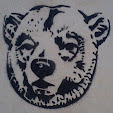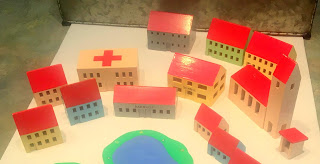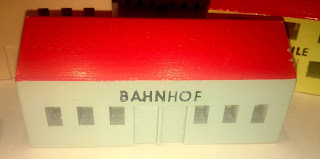And it gives a lot of depth to these and
their layer. These have been better finished though, maybe not to the same
'modern' standard as the little train, but the look 'produced' rather than home
made. They are relatively unique too; both by size and design. More of a
stand-alone wooden toy range than anything typically 'erzgebirge' as the
animals and people are.
They are hollow with full gap windows
(which may have been routed or drilled and then squared-off with chisels, some
skilled workmanship at last!), but this is the biggest clue as to the nature of
the set, it lacks the finesse of both later and earlier sets of
the type, and also avoids some of the more common tropes and memes of erzgebirge
playthings, and where those tropes are present, they are not the common
sizes?
The dressed-hedges (yew?) are also very
modern-looking, like the train, which would seem to be just low-enough to pass
through the tunnel?
The impression you get from the item as a
whole (the case and both its contents and possible age) is that it's half an
attempt to pick-up after the war with limited staff, budget and/or machinery
while having signs of an improved range coming through from the factory, a
turn-around piece?
If the following year (whenever that was)
there was more stuff of the quality of the train or above-hedges, it may be
that this case simply became obsolete and forgotten somewhere, but to find its
way to America in relatively pristine condition, one wonders if maybe it was
sold at a flea-market by the salesman after he's received his updated samples,
to a member of the US forces, or swapped for something. or some favour?
Contraband? Chocolate? Vehicle Parts? Who knows, but I suspect a GI took it
home to the 'States back in the 1950's?
While I've picked holes in it, I have done
so for the purpose of making sense of it, of trying to understand and date it,
not because I don't like it, it is a stunning survivor of a different age, there
is no damage, no playwear, it wallows in charm and deserves to be in a museum
somewhere, set-up under spotlights, behind spotless glass.
The company had been getting big in
early-learning toys and child-sized playroom or schoolroom furniture before the
war, so the crudities exhibited in some of the contents do point to struggle,
to austerity and recovery, while the better items point to that recovery being
months away when the case was filled for the salesman's trip round the toy
stores and departments. It also goes some way to explaining way the stuff is
'not quite' true, or 'standard' erzgebirge?
Many, many thanks to Mr Walton for sending me the original images, and for answering
the call for more pictures . . . twice! It's joy to post stuff like this;
there's a whole bunch of history in that box, but it's likely to remain mostly
a mystery history!








No comments:
Post a Comment